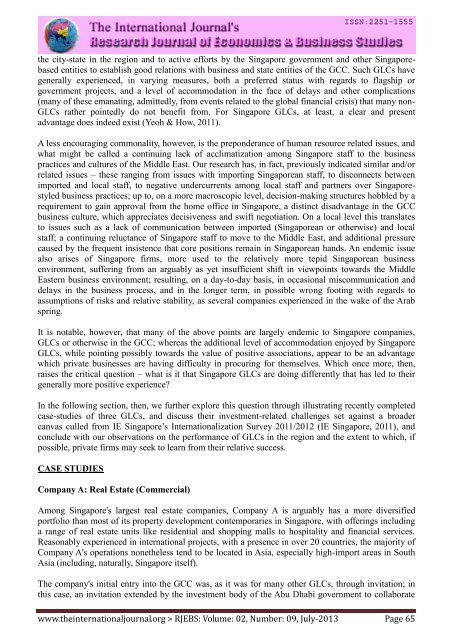Research Journal of Economics & Business Studies - RJEBS - The ...
Research Journal of Economics & Business Studies - RJEBS - The ...
Research Journal of Economics & Business Studies - RJEBS - The ...
You also want an ePaper? Increase the reach of your titles
YUMPU automatically turns print PDFs into web optimized ePapers that Google loves.
the city-state in the region and to active efforts by the Singapore government and other Singaporebased<br />
entities to establish good relations with business and state entities <strong>of</strong> the GCC. Such GLCs have<br />
generally experienced, in varying measures, both a preferred status with regards to flagship or<br />
government projects, and a level <strong>of</strong> accommodation in the face <strong>of</strong> delays and other complications<br />
(many <strong>of</strong> these emanating, admittedly, from events related to the global financial crisis) that many non-<br />
GLCs rather pointedly do not benefit from. For Singapore GLCs, at least, a clear and present<br />
advantage does indeed exist (Yeoh & How, 2011).<br />
A less encouraging commonality, however, is the preponderance <strong>of</strong> human resource related issues, and<br />
what might be called a continuing lack <strong>of</strong> acclimatization among Singapore staff to the business<br />
practices and cultures <strong>of</strong> the Middle East. Our research has, in fact, previously indicated similar and/or<br />
related issues – these ranging from issues with importing Singaporean staff, to disconnects between<br />
imported and local staff, to negative undercurrents among local staff and partners over Singaporestyled<br />
business practices; up to, on a more macroscopic level, decision-making structures hobbled by a<br />
requirement to gain approval from the home <strong>of</strong>fice in Singapore, a distinct disadvantage in the GCC<br />
business culture, which appreciates decisiveness and swift negotiation. On a local level this translates<br />
to issues such as a lack <strong>of</strong> communication between imported (Singaporean or otherwise) and local<br />
staff; a continuing reluctance <strong>of</strong> Singapore staff to move to the Middle East, and additional pressure<br />
caused by the frequent insistence that core positions remain in Singaporean hands. An endemic issue<br />
also arises <strong>of</strong> Singapore firms, more used to the relatively more tepid Singaporean business<br />
environment, suffering from an arguably as yet insufficient shift in viewpoints towards the Middle<br />
Eastern business environment; resulting, on a day-to-day basis, in occasional miscommunication and<br />
delays in the business process, and in the longer term, in possible wrong footing with regards to<br />
assumptions <strong>of</strong> risks and relative stability, as several companies experienced in the wake <strong>of</strong> the Arab<br />
spring.<br />
It is notable, however, that many <strong>of</strong> the above points are largely endemic to Singapore companies,<br />
GLCs or otherwise in the GCC; whereas the additional level <strong>of</strong> accommodation enjoyed by Singapore<br />
GLCs, while pointing possibly towards the value <strong>of</strong> positive associations, appear to be an advantage<br />
which private businesses are having difficulty in procuring for themselves. Which once more, then,<br />
raises the critical question – what is it that Singapore GLCs are doing differently that has led to their<br />
generally more positive experience?<br />
In the following section, then, we further explore this question through illustrating recently completed<br />
case-studies <strong>of</strong> three GLCs, and discuss their investment-related challenges set against a broader<br />
canvas culled from IE Singapore’s Internationalization Survey 2011/2012 (IE Singapore, 2011), and<br />
conclude with our observations on the performance <strong>of</strong> GLCs in the region and the extent to which, if<br />
possible, private firms may seek to learn from their relative success.<br />
CASE STUDIES<br />
Company A: Real Estate (Commercial)<br />
Among Singapore's largest real estate companies, Company A is arguably has a more diversified<br />
portfolio than most <strong>of</strong> its property development contemporaries in Singapore, with <strong>of</strong>ferings including<br />
a range <strong>of</strong> real estate units like residential and shopping malls to hospitality and financial services.<br />
Reasonably experienced in international projects, with a presence in over 20 countries, the majority <strong>of</strong><br />
Company A's operations nonetheless tend to be located in Asia, especially high-import areas in South<br />
Asia (including, naturally, Singapore itself).<br />
<strong>The</strong> company's initial entry into the GCC was, as it was for many other GLCs, through invitation; in<br />
this case, an invitation extended by the investment body <strong>of</strong> the Abu Dhabi government to collaborate<br />
www.theinternationaljournal.org > <strong>RJEBS</strong>: Volume: 02, Number: 09, July-2013 Page 65
















